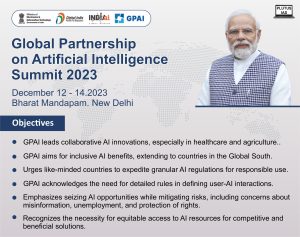15 Dec Global Partnership on Artificial Intelligence (GPAI)
This article covers “Daily Current Affairs” and the topic details “ Global Partnership on Artificial Intelligence (GPAI)”. This topic has relevance in the Science and Technology section of the UPSC CSE exam.
GS 3: Science and Technology
Why in the news?
The New Delhi declaration has been unanimously embraced by the Global Partnership on Artificial Intelligence (GPAI), an alliance comprising 29 member countries.
About Global Partnership on Artificial Intelligence (GPAI)
Inception and Launch:
- Proposed by Canada and France at the 2018 G7 summit.
- Officially launched in June 2020.
Membership Growth:
- Initially started with 15 member countries.
- Currently expanded to 29 member countries.
- Notable members include India, the United States, the UK, France, Japan, Canada, etc.
- China, a significant tech superpower, is not part of the alliance.
Hosting and Structure:
- Hosted by the Organisation for Economic Co-operation and Development (OECD).
Objectives of GPAI:
- Responsible Development of AI:
-
-
- Guides the responsible development and use of AI.
- Emphasizes respect for human rights and democratic values.
-
- Bridge the Gap:
-
-
- Multi-stakeholder initiative addressing the disparity between AI theory and practice.
-
- International Cooperation:
-
-
- Brings together expertise from science, industry, civil society, governments, international organizations, and academia.
- Aims to foster international cooperation on AI-related priorities.
-
- Cutting-Edge Research:
-
- Promotes advanced exploration and practical initiatives in the field of artificial intelligence.
The New Delhi Declaration:
The New Delhi Declaration marks a pivotal commitment by GPAI, positioning the partnership at the forefront of shaping the future of AI with a focus on innovation and collaborative efforts among member nations. The declaration underscores key elements:
- Innovation and Collaboration:
-
-
- GPAI pledges to lead in creating collaborative AI innovations, particularly in applications for healthcare, agriculture, and beyond.
-
- Global Governance Leadership:
-
-
- Members unanimously agree to take the lead in global discussions on AI governance, prioritizing safety and trust in its development.
- Inclusivity and Global Reach:
- GPAI commits to becoming an inclusive movement, extending its reach to countries in the Global South. The goal is to ensure that the benefits of AI, along with its platforms and solutions, are accessible to all.
-
- Acceleration of Regulations:
-
-
- Like-minded countries are urged to expedite the establishment of granular regulations around AI before the next GPAI meeting in Korea. The focus is on ensuring a comprehensive regulatory framework for responsible AI use.
-
- Granular Definition of Rules:
-
-
- GPAI acknowledges the necessity to delve into the specifics, defining intricate rules that dictate how users interact with AI.
-
- Addressing Opportunities and Risks:
-
-
- The declaration recognizes the imperative to harness new opportunities while mitigating risks associated with AI development and deployment.
- This includes concerns around misinformation, unemployment, lack of transparency and fairness, protection of intellectual property and personal data, as well as threats to human rights and democratic values.
- The declaration recognizes the imperative to harness new opportunities while mitigating risks associated with AI development and deployment.
-
- Equitable Access to Resources:
-
- The need for equitable access to AI resources is acknowledged, emphasizing that societies must consider, account for, and address this need to build competitive and beneficial AI solutions for all.

Significance of the New Delhi Declaration:
The New Delhi Declaration holds particular importance as it marks the first gathering of GPAI members following the emergence of generative AI platforms like ChatGPT and Google Bard, thrusting discussions on AI into the mainstream.
Key points of significance include:
- Mainstream Recognition:
-
-
- The meeting coincided with the rise of prominent generative AI platforms, elevating the discourse on AI to the mainstream for GPAI members.
-
- Thematic Priority in Agriculture:
-
-
- GPAI members collectively recognized the importance of supporting AI innovation in agriculture, designating it as a new “thematic priority.”
-
- India’s Push for Agriculture:
-
-
- India played a crucial role in advocating for agriculture as a priority sector for AI innovation within GPAI.
-
- Resilient Agricultural Practices:
-
-
- The declaration’s emphasis on AI in agriculture is pivotal for implementing resilient practices that enhance productivity and production in the sector.
-
- Sustainable Food Production:
-
- The development and access to trustworthy AI applications are highlighted as essential for ensuring sustainable food production systems. This is critical for building capacity in mitigating and adapting to climate change.
Significance for India:
The New Delhi Declaration holds special significance for India, reflecting a substantial victory for the country in the following ways:
- Collaborative Approach:
-
-
- India’s persistent advocacy for a collaborative approach in building AI systems is acknowledged. This aligns with the country’s efforts to promote its model of digital public infrastructure (DPI) globally.
-
- Sovereign AI System:
-
- Access to computing capabilities from GPAI member nations is seen as a boost to India’s plans of developing a sovereign AI system. This strategic move is essential for countering dominance from a limited number of foreign companies in the AI space.
Source: PM Modi calls for global framework for ethical use of AI (msn.com)
Download plutus ias current affairs eng med 15th Dec 2023
Q.1 Regarding the Global Partnership on Artificial Intelligence (GPAI) recently seen in the news, consider the following statements:
- It is an initiative proposed and initiated by India in partnership with the USA.
- China is not a member country.
- It emphasizes respect for human rights and democratic values.
How many of the above statement/s is/are correct?
(a) Only one
(b) Only two
(c) All three
(d) None
ANSWER: B
Q.2 Analyze the significance of the Global Partnership on Artificial Intelligence (GPAI) and the commitments outlined in the New Delhi Declaration in shaping the future of AI governance.



No Comments